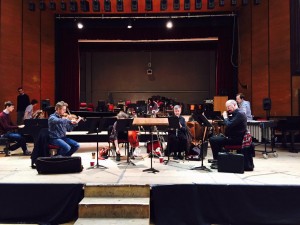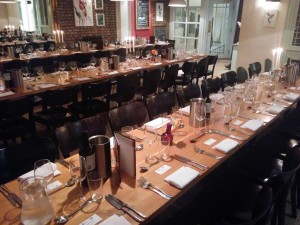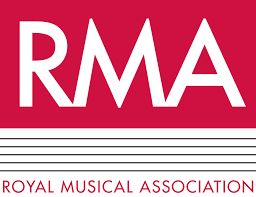RMA Research Students’ Conference 2015
Composition PhD Alex Glyde-Bates reports on his experience at the recent RMA Research Students’ Conference, held at Bristol University:
The year rolls around again. The mince pies have been finished, Auld Lang Syne has been sung, and I once more find myself on the platform of Southampton Central station on a cold early January morning. Thankfully, this time my trip would be a much shorter jaunt up to the wonderful city of Bristol for the annual Royal Musical Association’s Annual Research Student’s Conference. This year, unlike last year, I was going to give my first conference paper rather than going to attend a workshop performance of one of my compositions.
 After a quiet train ride, I arrive in Bristol and make my way to the Music Department. An impressive building, its neo-classical façade with its many columns make it stand out from its surroundings. Having arrived half-an-hour early, there was little to do apart from waiting for the conference registration to open. Soon, however, colleagues, from Southampton old and new, began to arrive along with PhD students from other universities that I had met at Birmingham the previous January.
After a quiet train ride, I arrive in Bristol and make my way to the Music Department. An impressive building, its neo-classical façade with its many columns make it stand out from its surroundings. Having arrived half-an-hour early, there was little to do apart from waiting for the conference registration to open. Soon, however, colleagues, from Southampton old and new, began to arrive along with PhD students from other universities that I had met at Birmingham the previous January.
Between current students and alumni, the Music department was one of the best represented at the whole conference. Seven students, spread across five different panels, represented on topics as diverse as the place of musicians in Seventeenth Century society, to the fusion of Rock guitar and Spectral music in the music of Tristan Murail. Nowhere did this become more apparent in one of the final panels of the conference, when three of the four speakers were either current or former students of Southampton.
After a few quick remarks from Katherine Ellis, the Head of Music at Bristol, the first panel sessions quickly got underway – everyone keen to get on with the business at hand. As always with the RMA Conferences, there are a wide variety of panels to attend. Meaning that the conference provides an ideal opportunity to sit in on papers in areas that aren’t your speciality, to be introduced to new ways of thinking and to see how other fields approach similar problems in different ways. After the first day of papers, the tired delegates all filed into a recital room to hear the first keynote of the conference, a fascinating paper by Katherine Ellis on Nineteenth Century listening habits.
 As I was at the conference with my musicological hat on, so to speak, I concentrated on seeing my fellow speakers, rather than sitting in on the composition workshops, which ran simultaneously to the panel sessions for all three days. Although, putting on concerts of the delegates compositions was a great way to allow people to both hear the speakers and the composers without having to choose between missing sessions and hearing the composers’ works.
As I was at the conference with my musicological hat on, so to speak, I concentrated on seeing my fellow speakers, rather than sitting in on the composition workshops, which ran simultaneously to the panel sessions for all three days. Although, putting on concerts of the delegates compositions was a great way to allow people to both hear the speakers and the composers without having to choose between missing sessions and hearing the composers’ works.
As my paper was due to be given on the final day of the conference, it meant that I could fully enjoy the second day’s proceedings without being distracted by worrying about my own paper. The highlights of the second day included the second keynote address by Dr Bettina Varwig on the Bach in the Twentieth-First Century and a round table discussion on ‘perspectives on analysing music and sound’. That evening was the conference dinner, always the event looked forward to the most. Taking place in Square Club, just around the corner  from the Music Department, it had the advantage of also being next to the hotel in which I was staying. The food was outstanding, and the conference organisers had taken the brave but fundamentally justified decision of drawing up a seating plan. While this led to us talking to people we hadn’t met before, it did leave me in the rather daunting position of having been sat next to the last keynote speaker of the conference, Professor Rachel Beckles Willson.
from the Music Department, it had the advantage of also being next to the hotel in which I was staying. The food was outstanding, and the conference organisers had taken the brave but fundamentally justified decision of drawing up a seating plan. While this led to us talking to people we hadn’t met before, it did leave me in the rather daunting position of having been sat next to the last keynote speaker of the conference, Professor Rachel Beckles Willson.
As I was giving the first paper the next morning I decided to get an early night. Having been warned about how often the first session the morning after the conference dinner can be lightly attended, but I was pleasantly surprised to turn up at 9am the next morning to find a full seminar room to give my paper to. My paper went well, and I received some great questions afterwards. I was followed by three other speakers, all of whom speaking on a similar area to me. It was great to have a panel that was specialised enough to have some in-depth discussion, but diverse enough that the conversation felt fresh and new.
 After giving my paper, and having attended a tightly packed two days of conference, I admit I needed a break and popped into the composers’ workshop for an hour or two before heading to the final keynote of the conference. Professor Rachel Beckles Willson’s talk, Ecologies of the musically sensorial, old and new was a fascinating and insightful discussion of music and the senses in a variety of context, and was note to end the conference on.
After giving my paper, and having attended a tightly packed two days of conference, I admit I needed a break and popped into the composers’ workshop for an hour or two before heading to the final keynote of the conference. Professor Rachel Beckles Willson’s talk, Ecologies of the musically sensorial, old and new was a fascinating and insightful discussion of music and the senses in a variety of context, and was note to end the conference on.
Southampton post graduate students who presented
Alexander Glyde-Bates — Performing uncertainty: Problematising the ‘Work-Concept’ in the Performance of Experimental Music
Rebecca Gribble — The Misunderstood Musician of the 18th Century
Martin Humphries — Values of acceptance: a ten-year retrospective of wind and brass band music at the British Composer Awards
David Jayasuriya — Fonte and Monte in Mozart’s Piano Sonatas, and the “Possibly Corrupt Minuet”, K.331
Ben Jameson — Rock meets spectralism: cultural associations of the electric guitar in Tristan Murail’s Vampyr!
Rachel McCarthy (recent alumni) — Psychoanalytic Constructions of ‘Woman’ in N-Dubz and the Occitanian Troubadours
Jack Webster — From the “Streets” to the Screen: The Importance of Offline Spatial Experience to the Online Distribution of Hip-Hop and Rap Music on YouTube in the UK


